#Cervical Cancer in Women
Explore tagged Tumblr posts
Text
Empowering Women's Health - Understanding and Preventing Cervical Cancer

Cervical Cancer is an important health risk for women globally as a result of HPV infection. Screening tests, such as Pap smears, enable the early discovery of unusual cells, resulting in improved outcomes.
The HPV vaccine is critical for avoiding cervical cancer. Dr. Suyash Agrawal, a prominent oncologist, emphasizes the necessity for ongoing screening and vaccines in managing this disease efficiently.
For more information, click here:- https://posts.gle/vw9ewo
#Cervical Cancer#Cervical Cancer in Women#Cervical Cancer Prevention#Best Oncologist in Indore#Best Cancer Surgeon in Indore#Cancer Specialist in Indore#Cancer Doctor in Indore
0 notes
Text
Cervical cancer is a preventable and treatable disease when detected early through regular screening and prompt medical intervention. With the expertise of Dr. Usha M Kumar, one of the leading Cervical Cancer Surgeons in Delhi, women can receive comprehensive and compassionate care for cervical cancer, ensuring the best possible outcomes for their health and well-being. By raising awareness of the signs and symptoms of cervical cancer and advocating for regular screening, we can work together to reduce the burden of this disease and improve the lives of women everywhere.
0 notes
Text


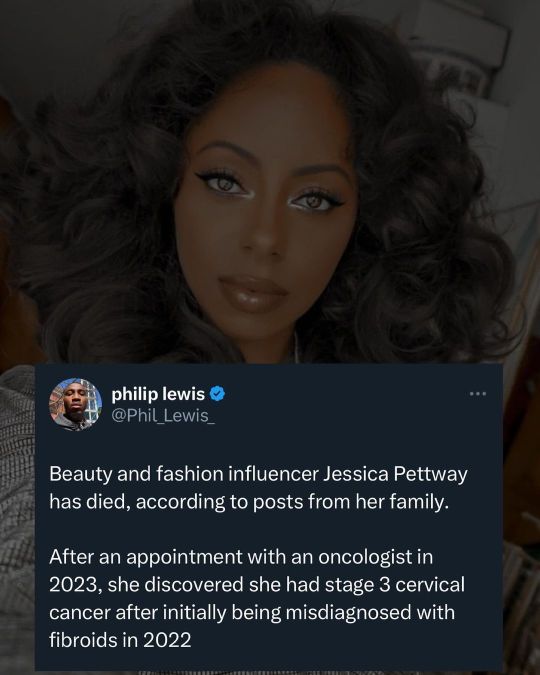


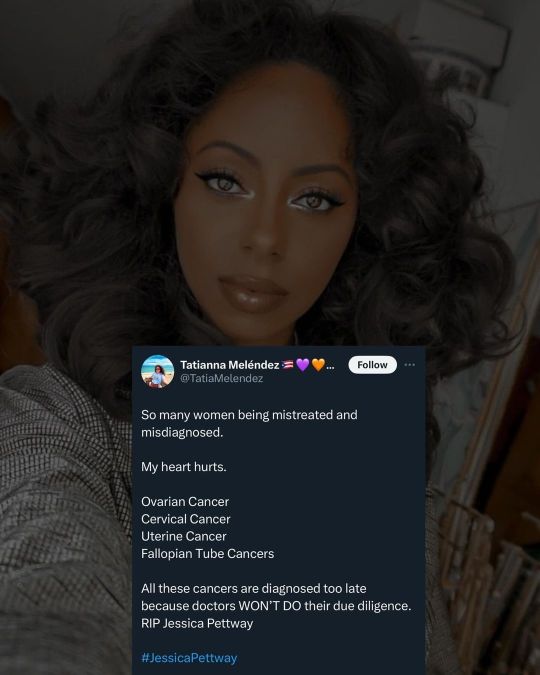

#jessica pettway#cervical cancer#misdiagnosis#beauty influencer#youtube#stage 3#cancer awareness#health#women's health#fibroids#cancer diagnosis#grief#mourning#bias in medicine#medical bias
342 notes
·
View notes
Text
Jesus fuck I thought Sam was gonna do a bit and was absolutely blindsided by the cancer talk. Holy shit. I'm so glad he's okay.
#It's also the first time anyone has explained to me why checking for cervical cancer is actually important#Instead of a 'eh just in case' it's 'there's a virus most people get that's usually harmless but for some people it can show up#Decades later and cause cervical cancer in women and tonsil cancer in men'#Given my track record with things staying in my body that shouldn't#It's the first time I've actually thought about getting screened as my own idea#And not just finally giving in to every doctor who has clucked their tongue#Assumed I was sexually active#And said 'you really should get checked'#Motherfucker knowing why changes things!
25 notes
·
View notes
Text
Harriet Williamson (April 29, 2023). "Trans-inclusive cervical cancer campaign defies anti-LGBTQ+ hate: ‘We deserve to be screened.’" PinkNews. https://www.thepinknews.com/2023/04/29/cervical-cancer-screening-smear-test-lgbtq-inclusive-remove-the-doubt/
Update: This news article is about a campaign for cervical cancer screening, called Remove The Doubt. The UK charity running the campaign was called Live Through This. Later, the charity changed its name to OUTpatients, so the campaign moved to their new site. Since then, you can visit the Remove The Doubt site here, which explains to anyone who has a cervix what they need to know about cervical cancer screening and HPV vaccines.
#cervical cancer#trans men#trans masculine#FTM#cisgender women#AFAB#HPV#transgender health#transgender#UK#HPV vaccine#sexually transmitted infections#relevant for transgender men and trans masculine nonbinary people and others on the female to male spectrum#relevant for cisgender women and transgender men and others who were assigned female at birth#queue#cancer#pelvic exam#vaccine#i'm not sure why the link displays with a different title than the article... i didn't do that
28 notes
·
View notes
Text
POONAM PANDEY ????
#omg#this is so insane#CERVICAL CANCER#the fact that the Indian medical system doesn’t do Pap smears for ‘’’’unmarried’’ women#or have cheap HPV backs#is femicide
19 notes
·
View notes
Text
#health & fitness#health and wellness#health tips#health#health wealth happiness#healthcare#healthyhabits#healthylifestyle#healthyliving#healthyfood#cervical cancer#cervical screening#cervical pain treatment#cervicalhealth#cervical spondylosis#women health#women#engineering#treatment
2 notes
·
View notes
Text
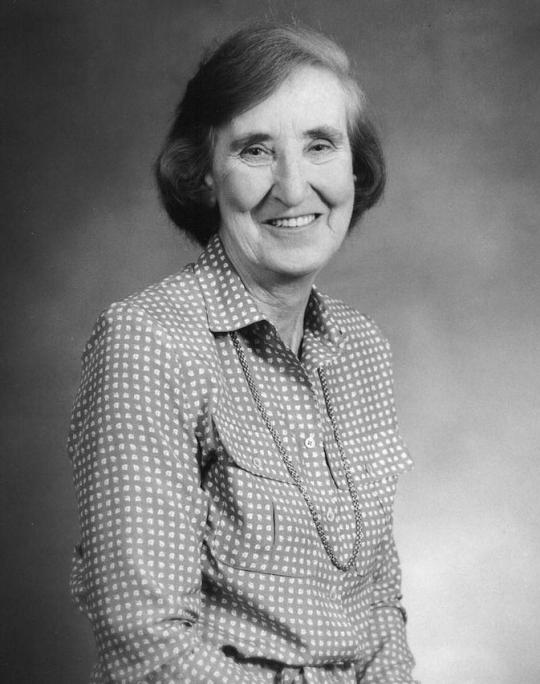
Janet Elizabeth Macgregor was born on January 12th 1920 in Glasgow.
Not a name the vast majority of you will know, but I love finding the unsung heroes, and Jane Macgregor is certainly in that category, her work has definately helped save countless women's lives.
Born as Janet Elizabeth McPherson in Glasgow, Betty, as she became known was just 7 when her mother died from tuberculosis. Betty attended school at Bearsden Academy, going on to study medicine at the University of Glasgow during the Second World War, graduating in 1943. It was there she met Alastair Macgregor and they married a year later. She did her house jobs at Glasgow Royal Infirmary and Western General Hospital.
During the next few years she raised their four children and worked part time in child welfare clinics. In 1958 Alastair was appointed to the regius chair of materia medica and therapeutics at Aberdeen University. Betty became a research assistant in the department of obstetrics and gynaecology, run by Sir Dugald Baird, regius professor of midwifery, who was famed for his compassion and social awareness.
It was in 1960 that it was decided to embark on a schedule of cervical testing for the entire area, Dugald Baird, inspired Macgregor to research the origins of cervical cancer and to concentrate especially on all the women - and in particular disadvantaged women - of the north-east.
Macgregor brought to the project a dedication, determination and considerable medical skills that ensured her programme worked efficiently. Diplomacy was also required, as all the GPs had to be written to (often repeatedly) in Aberdeenshire to obtain their approval so that smear testing could commence. Macgregor created a comprehensive call-and-recall system that broke new ground with its findings.
It was done so expertly under her supervision over the first five years there was such a decrease in the cervical cancer in the area and she had comprehensively proved her case. Betty was a superb cytologist and it has been commented, "the most delightful person. Without a doubt, she saved many lives."
It was not a period when priority was given to such a lengthy and complex medical programme: politicians had other demands on public funds. It was the way Macgregor organised the tests that brought the programme so much renown. Everything was meticulously documented and recorded with great care and attention. After five years she had assembled such powerful scientific evidence that other health authorities throughout the UK immediately adopted her system.
Her work brought Macgregor much esteem within the medical profession. She was much honoured by several of the Royal Societies and was a most distinguished president of her own medical association from 1980-83. During that presidency of the British Society of Clinical Cytology (BSCC), she published a book about improving the smear-test programmes nationally. It became a medical best-seller and sold 15,000 copies in its first edition and 10,000 in its second.
A memorable evening was held in 1985 whenBetty retired from Aberdeen University.
But this most active lady did not slip gently into retirement. She had bought a house on the Isle of Seil, off the coast at Oban, but Prof Templeton suggested she join a Birthright Programme he was initiating at the university. It was to research into pre-cervical care and patients who had slightly abnormal smear tests. "Betty accepted immediately and was as focused and enthusiastic as ever," he said. "She bought a house back in Aberdeen and did three days a week here and then travelled back to the west coast.
Macgregor wrote several medical books and was a regular contributor to the British Medical Journal. She was awarded the OBE in 1984/
It wasn't all work fior this dedicatec lady, Macgregor was devoted to her family and enjoyed taking her grandchildren sailing around Seil. She had her own yacht and loved the spectacular scenery of the west coast.
Betty Macgregor developed Alzheimer’s disease and died of cerebrovascular disease on 8th October 2005 at the Lynn of Lorne Nursing Home, Benderloch, near Oban.
#scotland#scottish#doctor#physician#cytologist#researcher cervical cancer#screening#womens healthcare#strong woman#history
24 notes
·
View notes
Text
Cervical cancer
Cervical cancer is a type of cancer that develops in the cervix, which is the lower part of the uterus that connects to the vagina. It is the fourth most common cancer in women worldwide and can affect women of all ages. However, it is most often diagnosed in women between 35 and years of age.
Causes of cervical cancer:
The main cause of cervical cancer is infection with human papillomavirus (HPV), a sexually transmitted virus. There are more than 100 different types of HPV, and some types can cause cervical cancer. Other factors that can increase the risk of cervical cancer include smoking, a weakened immune system, a family history of cervical cancer, and multiple sexual partners.
Symptoms of cervical cancer:
Cervical cancer does not necessarily cause symptoms in its early stages. As the cancer progresses, symptoms may include abnormal vaginal bleeding, pelvic pain or discomfort, pain during intercourse, and unusual vaginal discharge. It is important to note that these symptoms can be caused by other diseases, so it is important to consult a doctor to get a proper diagnosis.
Prevention and early detection of cervical cancer:
The most effective way to prevent cervical cancer is the HPV vaccine. The HPV vaccine protects against the types of HPV that cause most cases of cervical cancer, as well as against other types of HPV that can cause other types of cancer. The vaccine is recommended for males and females between 9 and 26 years of age.
Regular cervical cancer screening is also important for early detection. A Pap test is a test that checks for abnormal cells on the cervix. It is recommended that women start regular Pap tests from the age of 21. In addition, the new HPV test can also detect the presence of the virus that causes cervical cancer. Women should discuss with their healthcare provider which exams are right for them.
Treatment of cervical cancer:
Treatment of cervical cancer depends on the stage of the cancer and other factors such as the woman's age and general health. Treatment options may include surgery, radiation therapy, chemotherapy, or a combination of these treatments.
In summary, cervical cancer is a common female cancer that can be prevented by vaccination and detected early by regular screening. Women should consult with their health care provider to determine appropriate screening and vaccination. If cervical cancer is diagnosed, early treatment can lead to a better outcome.
For more information Visit: www.oncorelief.in
#Cervical cancer#Women's health#Cancer prevention#Cancer screening#HPV vaccine#Pap test#HPV test#Cancer treatment#Early detection#Health education#Gynecologic oncology#Oncology nursing#Reproductive health#Sexually transmitted infections#Public health#Medical research#Health advocacy#Patient support#Survivorship
4 notes
·
View notes
Text
Dr. Suyash Agrawal on Cervical Cancer - Insights and Innovations
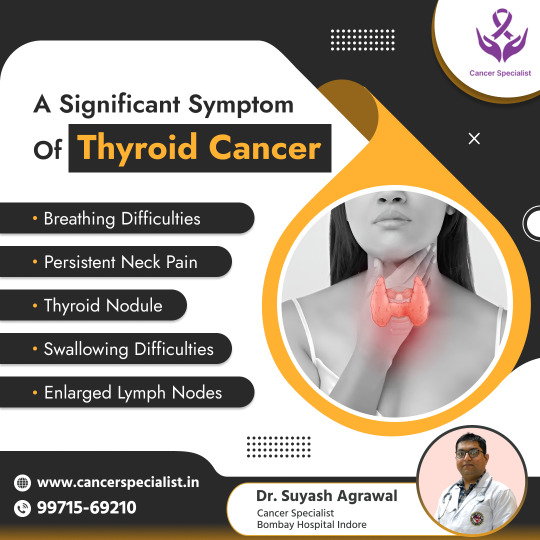
Cervical Cancer presents a significant health risk to women worldwide. Although it is the fourth most common cancer in women worldwide, it is also one of the most treatable and preventable types of cancer when detected and treated early.
Dr. Suyash Agrawal, a cancer specialist, will go over all aspects of cervical cancer, including risk factors, prevention methods, screening methods, and the most recent advancements in treatment options.
For More Information Visit Here: https://g.co/kgs/V8dn4U9
#Cervical Cancer#Cervical Cancer in Women#Cervical Cancer Prevention#Best Oncologist in Indore#Best Cancer Surgeon in Indore#Cancer Specialist in Indore#Cancer Doctor in Indore
1 note
·
View note
Text
Cervical cancer is a significant health concern affecting women worldwide, but with early detection and treatment, it can be effectively managed. Recognizing the signs and symptoms of cervical cancer is crucial for timely intervention and improved outcomes. In this comprehensive guide, we’ll explore the common signs of cervical cancer.
#Cervical Cancer in Women#Signs Of Cervical Cancer in Females#best gynecologist in delhi#best gynaecologist in delhi
0 notes
Text
Tips to Prevent and Spot Cervical Cancer Early!

Cervical cancer is one of the most common cancers affecting women worldwide. Yet, many women remain unaware of its risks, symptoms, and preventive measures. What if you could reduce your chances of developing this disease significantly just by being informed and proactive? The good news is that with early detection and prevention strategies, you can empower yourself and others to take control of their health. In this article, we’ll explore how to prevent and detect cervical cancer early, making it easy for you to stay informed.
What is cervical cancer?
Cervical carcinoma originates in the cells of the cervix. The primary cause of cervical carcinoma is persistent infection due to human papillomavirus (HPV). Not all HPV infections lead to cancer, but certain strains can cause changes in cervical cells over time, leading to cancer if left untreated. Understanding this relationship is crucial for prevention, as it highlights the importance of vaccination and regular screenings.
What are the early warning signs of cervical cancer?
Cervical cancer typically progresses gradually and may not present symptoms in its early stages. However, as it advances, certain warning signs may become noticeable, such as:
Unusual Bleeding: This could be bleeding between periods, after intercourse, or after menopause.
Pelvic Pain: If there is a chronic pelvic pain, it can indicate a more serious issue.
Unusual Discharge: Changes in vaginal discharge, particularly if it is watery, pink, or foul-smelling, should not be ignored.
Pain During Intercourse: If you experience pain during sex that is new or worsening, it’s essential to consult a healthcare provider.
While these signs may not necessarily indicate cervical cancer, they warrant further investigation.
How can you prevent cervical cancer?
Prevention is your first line of defence against cervical cancer. Here are few methods you can adopt:
Get Vaccinated: One of the most powerful tools against cervical cancer is the HPV vaccine. The Cervavac injection is a notable option, providing protection against the most common strains of HPV linked to cervical cancer. Vaccination can majorly decrease the risk of developing HPV-related cervical cancer, especially when given before the onset of sexual activity.
Regular Screenings: Routine Pap tests and HPV tests are crucial for early detection. Such tests can identify abnormal cells in the cervix before they develop into cancer. It’s generally recommended to start screening at age 21 and continue every three years until age 29. For women between 30 to 65 of age, a Pap smear test combined with an HPV test every five years is often advised.
Safe Sex: Using condoms and reducing the number of sexual partners can minimize the risk of HPV infection. While condoms don’t completely eliminate the possibility of contracting HPV, they significantly lower the risk.
Avoid Smoking: Smoking weakens the immune system, which in turn make it harder for the body to fight off infections, including HPV. Quitting smoking can improve your overall health and reduce the risk of cervical cancer.
Stay Informed and Educated: Knowledge is power. Staying informed about cervical cancer, its risks, and prevention methods can empower you to take proactive steps toward your health.
What should you include in your cervical cancer diet?
A healthy meal can play a role in cancer prevention, including cervical cancer. Here are some dietary tips to consider:
1. Fruits and Vegetables
Focus on including a variety of vibrant fruits and vegetables in your meals. These colourful foods are packed with antioxidants and vital vitamins that play a key role in strengthening your immune system.
2. Whole Grains
Brown rice, quinoa, and whole wheat products are good for your health. These grains are excellent sources of fibre and essential nutrients that contribute to overall health.
3. Lean Proteins
Choose lean protein options like chicken, fish, and legumes. These are important for building and maintaining a healthy body while also supporting immune function.
4. Healthy Fats
Eat healthy fats from sources such as avocados, nuts, and olive oil. These fats are beneficial for your overall health and can promote well-being.
5. Minimise Processed Foods
Avoid eating processed and sugary foods. Reducing these items can help you keep a normal healthy weight and reduce your chances of getting cancer.
What lifestyle changes can lower your risk?
In addition to dietary changes, there are several other ways you can adopt to reduce your risk of cervical cancer:
Healthy Weight: Obesity is linked to various cancers, including cervical cancer. Regular exercise and a balanced meal can help you maintain a healthy weight.
Stress: It can weaken the immune system. Engage in stress-reducing activities like yoga, meditation, or spending time in nature.
Alcohol Consumption: Drinking alcohol in moderation is advisable, as excessive consumption can increase cancer risk.
Final thoughts
Being proactive about your health is the best way to prevent and detect cervical cancer early. By understanding the risks, recognising the warning signs, and adopting good healthy habits, you can reduce your chances of developing this disease. Remember, regular screenings and vaccinations are crucial tools in your prevention arsenal. Don’t hesitate to discuss any issues you experience with your doctor; they are there to help you navigate your health journey. Your awareness and action can make all the difference in protecting yourself from cervical cancer.
0 notes
Text
youtube
#HPV genotypes#cervical cancer#high-grade lesions#invasive cervical carcinoma#Mauritania health#CIN2#CIN3#HPV prevalence#cervical lesions#HPV vaccination#cervical cancer prevention#women's health Mauritania#HPV16#HPV18#cancer epidemiology#HPV screening#HPV infection#prophylactic vaccination#public health#cancer control strategies.#Youtube
1 note
·
View note
Text
I'm of an age where I'm quickly learning all doctors want to say, "you're just getting older" to every damn, weird symptom I have. And I'm damn tired of it.
Why are women issues all so secret?
When I was a young mother, no one wanted to talk about breastfeeding or stuff going on "down there," and back then I was too shy to bring it up...
I'm nearly 50. And dammit we need to talk more about our vaginal health and our experiences.
Like my blurry vision? Clumsiness? Can't sleep- every day waking at 3am? Itchy skin? High blood pressure? Uncontrollable weight gain?
I learned from TT videos that's all perimenopause.
And now this? About short spurts of bleeding after menopause being a sign of cancer?
I didn't know that!
Why aren't we talking about these things, and why am I learning about it from posts and videos? I mean, I'm so glad I am, but we need to be talking about it.
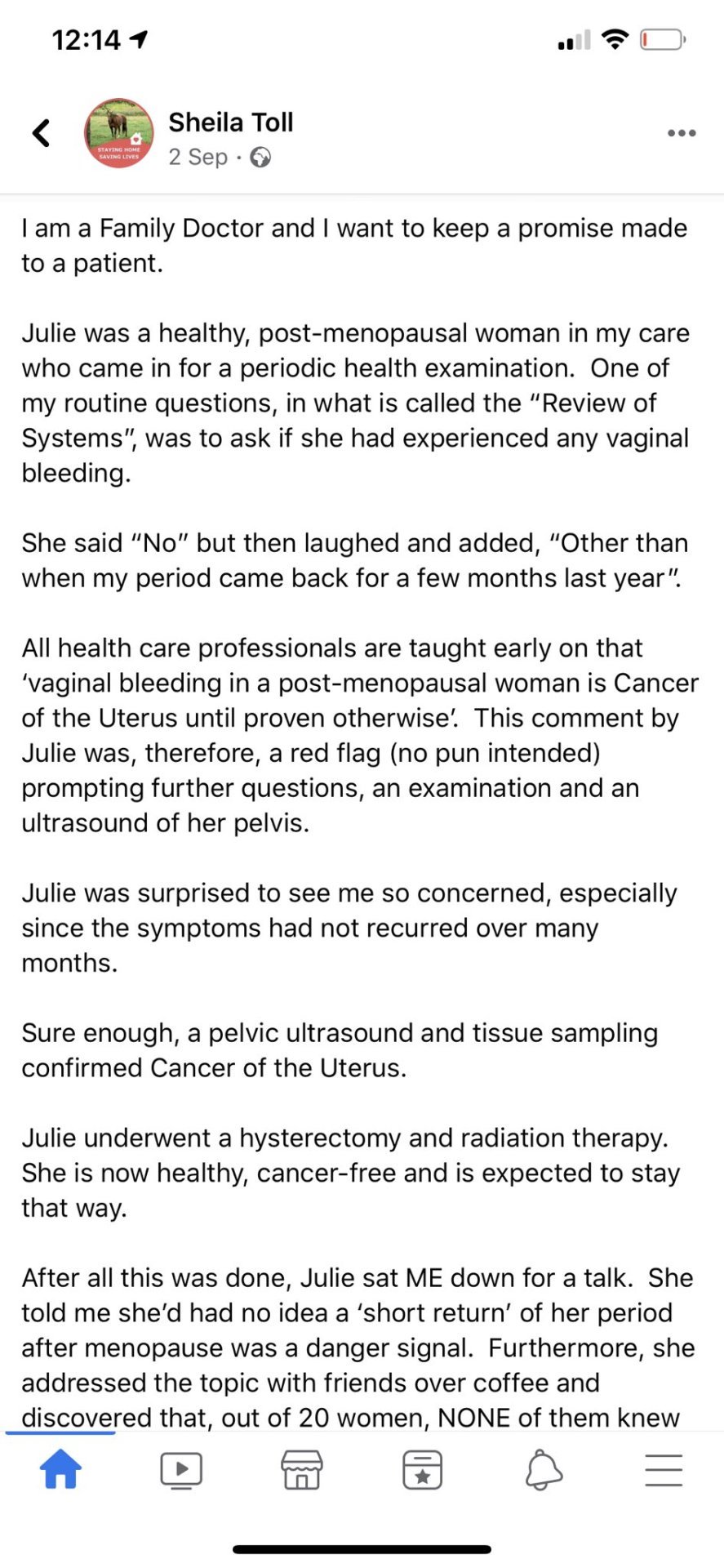
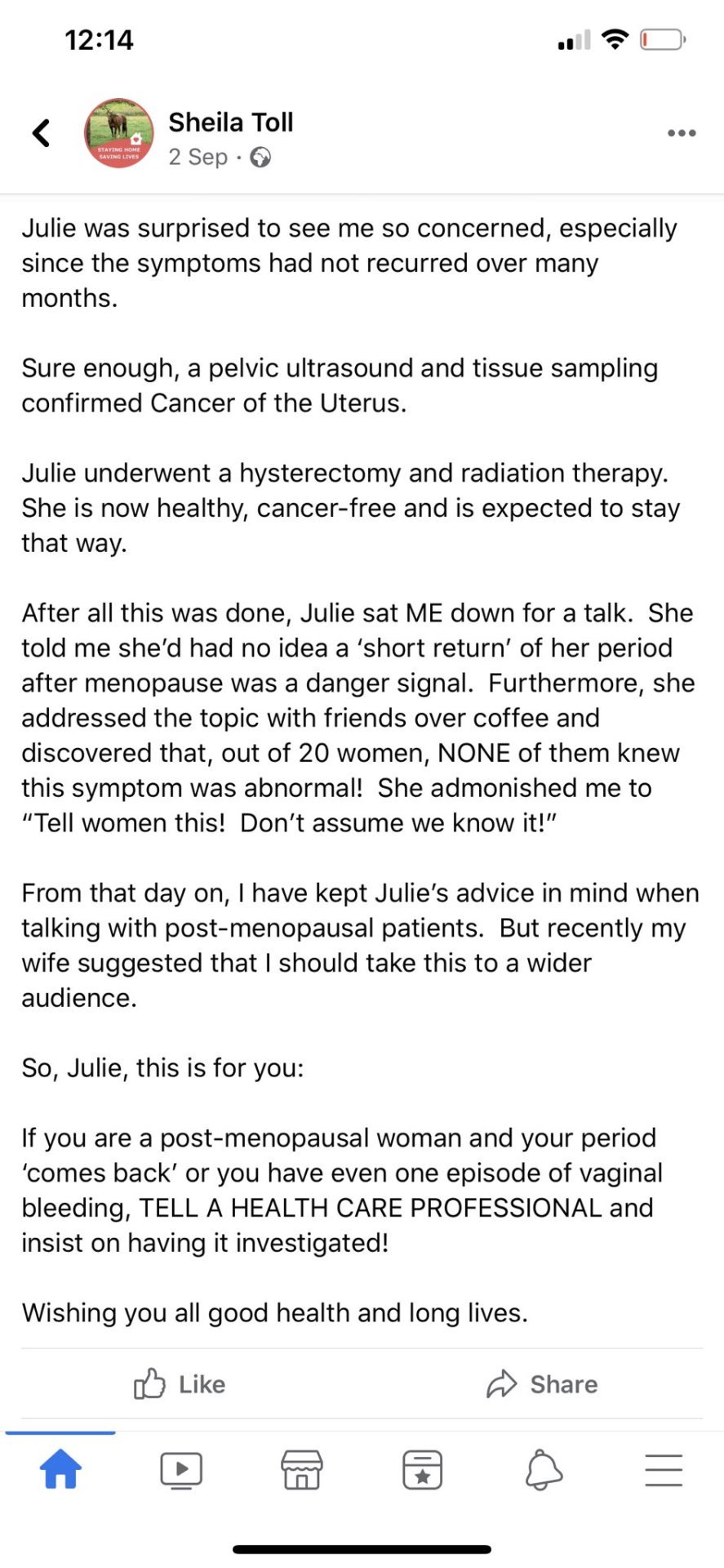
fresh, clean no-terf version for reblogs!
Your mom and aunts aren’t on tumblr. Please warn them about this as well.
138K notes
·
View notes